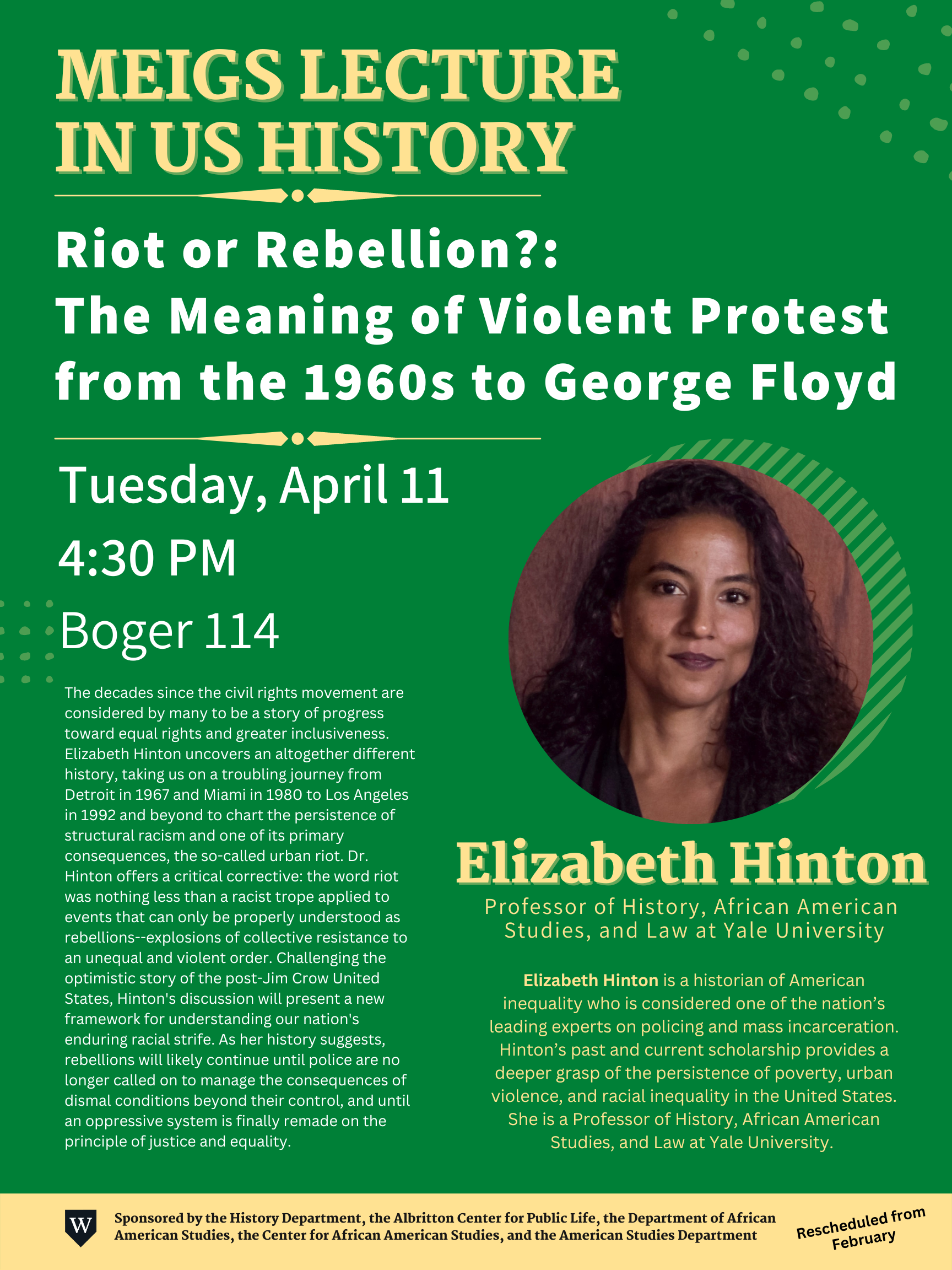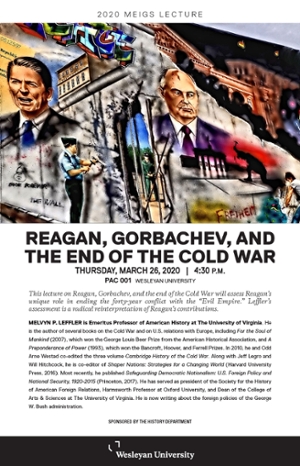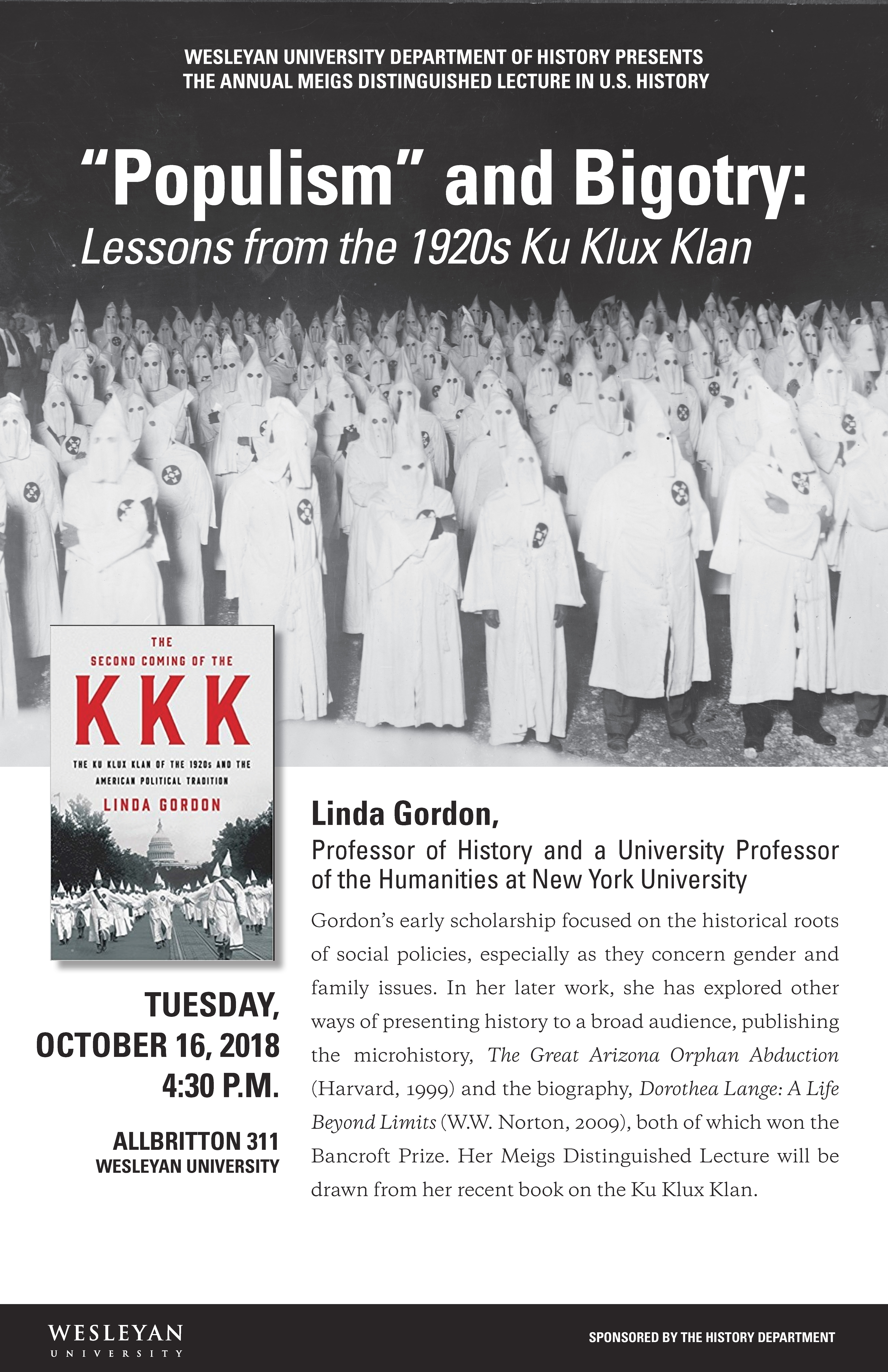WESLEYAN UNIVERSITY DEPARTMENT OF HISTORY PRESENTS THE ANNUAL MEIGS DISTINGUISHED LECTURE IN U.S. HISTORY
-

2025 Distinguished Meigs Lecture: Making a Killing: Cops, Capitalism, and the War on Black Life
Robin D. G. Kelley will give the Wesleyan History Department's Distinguished Meigs Lecture this year.
Thursday, May 1 @ 4:30PM in PAC/FCPA 100
Drawing on his forthcoming book, Kelley examines the hidden relationship between policing, gendered racial capitalism, and collective organized resistance. Taking as astarting point Ruth Wilson Gilmore’s oft-quoted definition of racism as “the state-sanctioned and/or extralegal production and exploitation of group-differentiated vulnerability to premature death,” he reconstructs the lives and life-worlds of selected victims of state violence in order to uncover the policies and processes that rendered them vulnerable to premature death in the first place. Although Making a Killing takes a long historical view, at times reaching back to the 19th century, the focus is on policing in the neoliberal city, when federal cutbacks and the global slump of the 1970s left many municipalities financially strapped. Urban police departments simultaneously became budgetary burdens as well as new vehicles to generate revenue. Police, in tandem with other state and corporate entities, have increasingly become engines of capital accumulation, government revenue, gentrification, the municipal bond market, the tech and private security industry—in a phrase, the profits of death.
While laying bare the operations of our own American thanatocracy, Kelley also shows how the struggle to defend and protect Black lives remains the tip of the spear in our current resistance to rising fascism.
Robin D. G. Kelley is Distinguished Professor and Gary B. Nash Endowed Chair in U.S. History at UCLA. Member of the American Academy of Arts and Sciences, he is the recipient of many awards and fellowships, including a Guggenheim Fellowship and Freedom Scholar Award. His books include the award-winning, Thelonious Monk: The Life and Times of an American Original; Hammer and Hoe: Alabama Communists During the Great Depression; Freedom Dreams: The Black Radical Imagination; Race Rebels: Culture Politics and the Black Working Class; Yo’ Mama’s DisFunktional!: Fighting the Culture Wars in Urban America (Beacon Press 1997); Africa Speaks, America Answers: Modern Jazz in Revolutionary Times.
His essays have appeared in dozens of publications, including The Nation, New York Times, American Historical Review, American Quarterly, African Studies Review, Social Text, Metropolis, Journal of American History, New Labor Forum, and The Boston Review, for which he also serves as Contributing Editor.
-

2023 MEIGS LECTURE: Riot or Rebellion?: The Meaning of Violent Protest from the 1960s to George Floyd
Elizabeth Hinton, Professor of History, African American Studies, and Law at Yale University, will deliver the annual Meigs Lecture in US History.
TUESDAY, Aprill 11 | 4:30 PM, Boger 114
Elizabeth Hinton is a historian of American inequality who is considered one of the nation’s leading experts on policing and mass incarceration. Hinton’s past and current scholarship provides a deeper grasp of the persistence of poverty, urban violence, and racial inequality in the United States. She is a Professor of History, African American Studies, and Law at Yale University.
Sponsored by the History Department, the Albritton Center for Public Life, the Department of African American Studies, the Center for African American Studies, and the American Studies Department.
Talk Abstract: The decades since the civil rights movement are considered by many to be a story of progress toward equal rights and greater inclusiveness. Elizabeth Hinton uncovers an altogether different history, taking us on a troubling journey from Detroit in 1967 and Miami in 1980 to Los Angeles in 1992 and beyond to chart the persistence of structural racism and one of its primary consequences, the so-called urban riot. Dr. Hinton offers a critical corrective: the word riot was nothing less than a racist trope applied to events that can only be properly understood as rebellions--explosions of collective resistance to an unequal and violent order.
Talk Abstract ContinuedChallenging the optimistic story of the post-Jim Crow United States, Hinton's discussion will present a new framework for understanding our nation's enduring racial strife. As her history suggests, rebellions will likely continue until police are no longer called on to manage the consequences of dismal conditions beyond their control, and until an oppressive system is finally remade on the principle of justice and equality.
-

2020 MEIGS LECTURE: REAGAN, GORBACHEV, AND THE END OF THE COLD WAR
MELVYN P. LEFFLER is Emeritus Professor of American History at The University of Virginia.
This lecture on Reagan, Gorbachev, and the end of the Cold War will assess Reagan’s unique role in ending the forty-year conflict with the “Evil Empire.” Leffler’s assessment is a radical reinterpretation of Reagan’s contributions.
Read More
THURSDAY, MARCH 26, 2020 | 4:30 P.M., PAC 001
Sponsored by the History DepartmentHe is the author of several books on the Cold War and on U.S. relations with Europe, including For the Soul of Mankind (2007), which won the George Louis Beer Prize from the American Historical Association, and A Preponderance of Power (1993), which won the Bancroft, Hoover, and Ferrell Prizes. In 2010, he and Odd Arne Westad co-edited the three volume Cambridge History of the Cold War. Along with Jeff Legro and Will Hitchcock, he is co-editor of Shaper Nations: Strategies for a Changing World (Harvard University Press, 2016). Most recently, he published Safeguarding Democratic Nationalism: U.S. Foreign Policy and National Security, 1920-2015 (Princeton, 2017). He has served as president of the Society for the History of American Foreign Relations, Harmsworth Professor at Oxford University, and Dean of the College of Arts & Sciences at The University of Virginia. He is now writing about the foreign policies of the George W. Bush administration. -

“Populism” and Bigotry: Lessons from the 1920s Ku Klux Klan (Fall 2018)
Linda Gordon, Professor of History and a University Professor of the Humanities at New York University.
Read MoreGordon’s early scholarship focused on the historical roots of social policies, especially as they concern gender and family issues. In her later work, she has explored other ways of presenting history to a broad audience, publishing the microhistory, The Great Arizona Orphan Abduction (Harvard, 1999) and the biography, Dorothea Lange: A Life Beyond Limits (W.W. Norton, 2009), both of which won the Bancroft Prize. Her Meigs Distinguished Lecture will be drawn from her recent book on the Ku Klux Klan.
Tuesday, October 16, 2018
4:30 p.m.
Allbritton 311Sponsored by the History Department
